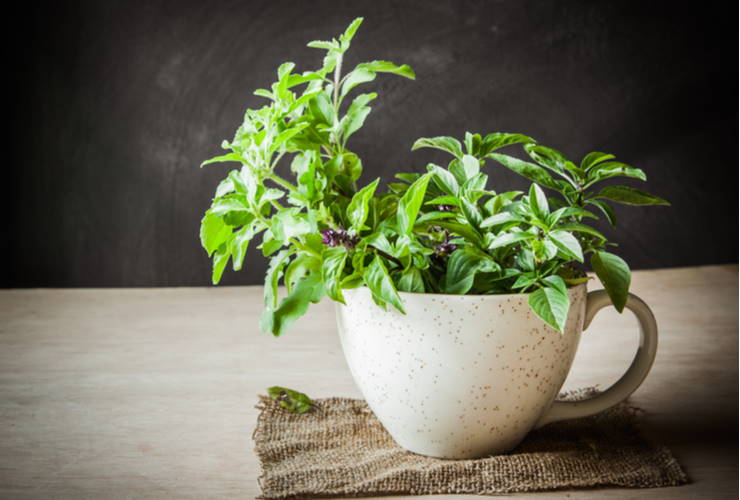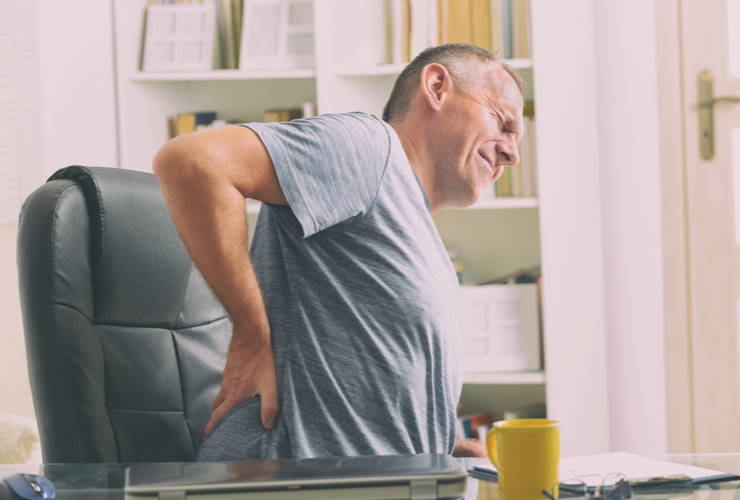 Dr. Herzog
Dr. Herzog Dec 1, 2019
Dec 1, 2019
ANXIETY AND DEPRESSION - SYMPTOMS AND CAUSES
The next read is an excerpt from "The Doctor's Book of Survival Home Remedies", Chapters: Anxiety and Depression, pages 33-34 & 117-118:

UNDERSTANDING BOTH
Anxiety and depression are different conditions, but they often appear together. Which is why one is commonly misunderstood for the other. In fact, according to the Mayo Clinic depression can trigger anxiety and the other way around.
Brain imaging technology enables researchers to see an intriguing link between these two conditions. A study involving a group of depressed women examined the hippocampus, which is at the side of the brain. It's important for long-term memory and recollection.
Researchers observed a smaller hippocampus in most of the subjects.
They suspect the stress hormone (i.e. anxiety) damages the system that grows nerve cells that region. So without new cells, the hippocampus stops growing.
But let's take a quick look at each condition individually to gain a better understanding of them.
Anxiety
Imagine your adolescent daughter asks if she can sign up to join a softball team that meets after school every Tuesday. Jessie's never shown any interest in sports, so you jump into action. Sounds like a good way to stay out of trouble! You sign her up in a heartbeat, online.
A week later you ask her if she's gone to practice yet. Nope. A few days go by and you ask her again. Crickets. And on it goes. Eventually it's the end of the season and you ponder why your daughter asked to sign up for baseball and didn't go to even one practice.
You find your mind going to dark places thinking of the possible reasons why. But you soon give your head a shake. You know you can trust her. She's a good person who would do anything for her family.
Chances are...anxiety is what prevented her from going to even a single game. What else has it stopping her from doing?
Jessie's is not a unique case. Anxiety is more or less part of the human condition. We all have to learn how to deal with the external pressures we have, which cause most of our anxiety.
A certain amount of anxiety is unavoidable. The fight or flight response that our body uses to prepare us for action gets triggered mentally by some form of stress. If the trigger is something that risks our safety, like a vicious doberman bearing its teeth and growling in your face-your 'fight or flight' type of anxiety is good.
If, on the other hand, you freeze with fear and anxiety when you see a small dog quietly walking on a leash held by its owner? Not good. You would be exaggerating the potential danger of that cute little dog, causing yourself undue anxiety.
So that external pressure I mentioned above? Well, it's actually coming from your internal self-it's internal pressure. It activates when you have to deal with things that are uncomfortable. Symptoms of anxiety erupt at those times.
What's important here is that if the cause of the anxiety is internal, you can learn to control it.
It helps to understand that anxiety turns up at a young age-much younger than Jessie, in fact. Even such trauma as potty training, trying to get good grades in school, trying not to be late, or trying to keep up with your classmates in sports. All of these can cause uncomfortable feelings that we call 'anxiety'.
>>> GET THE BOOK TO DISCOVER THE FULL CHAPTER <<<

Depression
Scientists now know this illness is more complex than simply a chemical imbalance. If only it were that simple. It appears there are various causes of depression - like mood regulators gone nuts - which scientists are just beginning to discover.
One thing they've long known is that the electrical system - the cells, neurons inside the cells, neurotransmitters, and synapses - play a significant role in depression.
Neurotransmitters are chemicals that act like messengers, carrying information from cell to cell. They keep a healthy person's senses, learning, movement, and mood all running tickety boo.
But a person with major depression will have an impaired system. The neurotransmitters stop working optimally for a variety of reasons. A message might get lost if the originating cell does not produce enough of a neurotransmitter, for example. Or a neuron's receptors just stop communicating with certain neurotransmitters. So the synapses stop firing.
The question is, then, how does someone with the (above) impaired electrical system experience her senses, learning, movement, and mood? It's clear people with major depression stop experiencing joy in life. Could that loss of joy be connected to the impaired electrical system?

SYMPTOMS OF ANXIETY
Scientists know that anxiety and depression are biophysical conditions, signs of which can be seen with Electroencephalography (EEG). This records abnormalities in your brain waves. EEGs have shown hypervigilant central nervous systems when subjects were in a fight or flight state of mind. More signs and symptoms are as follows.
Panic Attack: Symptoms include feeling of being out of control, dizziness, *chest pain, clammy hands and feet, heart palpitations, shortness of breath or hyperventilation.
*Chest pain from a panic attack is often mistaken for a heart attack. One difference is that heart attack victims are usually active when it comes on. People with anxiety-based chest pain are usually at rest.
Brain Fog, forgetfulness, and insomnia disrupt the flow of everyday life.
Emotional signs include fear or panic of an imagined danger; a general sense of doom. In addition, overall worry is a common symptom.
Thinking process gets stuck in a jam, looping back again and again ad nauseum to that which worries you.
Avoidance - at all costs - of the activity that triggers the anxiety.
Anxiety affects your organs: the gastrointestinal system, for example. Symptoms are diarrhea or tummy upset because your gastrointestinal system becomes hyperactive. This causes it to secrete more acid than normal.
Even your circulatory system can't escape. Anxiety can give you hypertension and even make your heartbeat pound louder and faster-sometimes causing hyperventilation.
The largest organ-skin-also can show signs of anxiety. It sweats more, the hair on your arms might stand up on end, and you might feel flush and generally sweaty.
SYMPTOMS OF DEPRESSION
According to The National Institute of Mental Health if you feel some of the following types of symptoms every day for at least two weeks you probably have depression.
Loss of interest in your usual activities, including hanging out with friends.
Constant fatigue but problems sleeping
Slow talking and lack of concentration
Loss of appetite and digestive problems without apparent cause
"Empty" mood and often irritable
Feelings of hopelessness and thoughts of death or suicide
CAUSES OF ANXIETY
Lack of Sleep
Consistently, sleep deficit can lead to anxiety. One reason is that your circadian rhythm will be interrupted. The circadian system regulates a wide range of biological functions, including metabolism and the release of hormones.
You also have a regulator called 'homeostatic sleep-drive', which tells the body when to sleep and when to wake up. It regulates your quality of sleep, among other functions. Many things can have a negative impact on your homeostasis, including medications, stress, sleep environment, and what you eat and drink.
Using Electronic Devices
Exposure at night to the light from your mobile phone, tablet, and/or computer disrupts your homeostasis. In other words, you stay awake. If this becomes a chronic sleep problem, it can lead to anxiety.
Illness
It might be obvious, but is worth mentioning. Serious illness can and usually does cause a great deal of worry for the person who is ill and her loved ones. As mentioned above, worry is a symptom of anxiety.
Major Unwanted Changes in Life
Loss of a loved one (including a pet), failure of a marriage, loss of a job or demotion, loss of property due to natural disaster or criminal activity, and more.
CAUSES OF DEPRESSION
Chronic Pain and Inflammation
Recent research shows that chronic pain causes brain inflammation, which leads to anxiety and depression. The inflammation alters the region of the brain that regulates mood and motivation.
Structural change in the brain
The cognitive function of emotional facial processing and the visual recognition network are actively engaged when people interact in social situations. Researchers found evidence of a link between depression and structural change in these regions of the brain.
Low levels Omega-3
People with depression may have low levels of brain chemical commonly known as EPA and DHA. These are also be found in fish oil.
Chronic Anxiety
This condition can trigger depression. Read on and find the guidelines for the management of these conditions. They will all benefit both anxiety and depression.
MANAGEMENT
Our society has been hoodwinked into thinking we can dissolve anxiety and depression with a pill or two. If you or anyone you know has struggled with crippling anxiety or depression - or both - you've maybe seen firsthand that anti-anxiety, anti-depressant, and anti-psychosis pill just numb the mind. Often causing worse complications-the worst of course being suicide.
The good news is, you can make some simple adjustments in your lifestyle to provide your mind and body with what it needs to stay calm. Here are some ways to manage anxiety and depression. Most of them will not cost you a penny.
Sleep
It's simple. Our bodies function better when we get a consistently good sleep at night. A good habit to promote sleep is to put yourself on a schedule and stick to it. Going to bed and getting up at the same time every day helps your circadian and homeostasis rhythms.
Create a peaceful atmosphere in your bedroom if you can. Keep low lights in your bedroom and no TV or computer. Fragrant plant-based oils (like lavender, orange, chamomile, lemon balm, pine, fir, cedar, or gardenia) dispersed in the air at night with a diffuser can put you in just the right mind frame to sleep. In fact, the sound of the water trickling in the diffuser might lull you to sleep as it does me!
Nutrition
Omega-3 Fatty Acids is found in fish. Varieties with high oil content like salmon, trout, herring, and sardines are good sources. Cod liver oil - a tablespoon a day - is also a good source if you can stand the taste.
St. John's Wort, evidence shows, may combat mild to medium cases of depression. It has been used for centuries in Europe for anxiety, depression, and other mental disorders.
Researchers found that vitamins B, B12, and folic acid might be low in people with depression. Eat a daily diet rich in foods that provide these nutrients. Folate-rich foods like beans, lentils, dark leafy greens, sunflower seeds, avocados, and more.
While there is no scientific evidence that herbs like Lavandula angustifolia (lavender), Matricaria recutita (chamomile), and Melissa officinalis (lemon balm) treat depression effectively, many people report their emotionally calming effect.
Turmeric is excellent for inflammation, and easy to prepare at home. (See PART II, Chapter 3 for method)
Reishi mushroom for inflammation. (Available at a health food store or online)
Steamed broccoli for inflammation. (Steam for 10 minutes 1.5 cups per day or make fresh juice with a masticating juicer.)
Eat a balanced diet that includes 2-3 enormous vegetable servings every day. Snack on vegetables-especially broccoli, because of its anti-inflammatory properties. Also include parsley, cilantro, squash, carrots, and other antioxidant-rich vegetables. Refresh yourself in mid-day with a glass of fresh vegetable juice if you have a juicer. Yes - at the end of the day - that's a heck of a lot of vegetables!
>>> GET THE BOOK TO DISCOVER THE FULL CHAPTER <<<
It is forbidden to replicate any of the above content without Dr. John Herzog's consent. However, in order to support the discounts and donations we're making, we depend on free advertising. The doctor needs your help in sharing this with the world.
Recent Posts

HOLY BASIL

Producing Your Own Penicillin From Oranges

PAIN MANAGEMENT - DIY TIPS

ANXIETY AND DEPRESSION - SYMPTOMS AND CAUSES

TURMERIC - HOME REMEDIES MADE EASY

BAY LAUREL

CONDITIONS GARLIC CAN REMEDY

ALZHEIMER'S AND DEMENTIA

CARDIOVASCULAR ISSUES

What really is blood pressure?

CONDITIONS GREEN TEA CAN REMEDY

VITAMIN C's IMPACT ON CANCER

The Three Main Types of Diabetes

Spirulina one of the most curative and prophylactic foods

Isn't Arthritis An Old Folk's Disease?